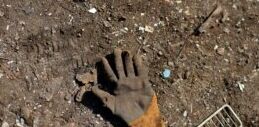正文
VOA慢速英语:加沙民众回收旧车的废旧金属出口获利
A new Israeli policy permits people in The Gaza Strip to sell old metal and send it to Israel for processing. Gaza is a Palestinian area bordering Israel and Egypt. The territory has an estimated 49 percent unemployment rate.
Many old cars from Israel were sent to the northern part of Gaza many years ago. These cars stayed at junkyards, places where old things that are no longer used are stored. Gaza does not have the factories needed to melt down and process the metal waste.
Palestinian merchants estimate that 200,000 tons of metal waste has built up near Gaza's border since an Israeli-led blockade of the territory started in 2007.

Last October, however, Israeli officials cleared the waste metal for export to a crushing factory inside Israel. The move has brought revenue and jobs to the poor area.
People in Gaza sell the waste metal for around $228 for one ton. Israel permits 1,000 tons to be exported per week. It is estimated that in four years, all the extra metal that remains will have been sold and recycled.
The merchants say the exports have created work for about 6,000 Palestinian workers in Gaza. Gazans have earned about $3 million since the project started, Israel said.
Emad Aqail is a 39-year-old metal worker from Gaza. He feeds metal into pressing machines, so it is ready for export.
"There is almost no work in town...Working in metals is exhausting, but it gives me the income I want."
Many Gazans would like to crush and recycle the metal for use inside their territory. However, Israel and Egypt restrict machines from going into the Gaza Strip. The two countries consider the militant, Islamist group Hamas, which rules Gaza, a security threat. No equipment, such as new metal pressing machines, can be sent to Gaza because it can also be used to manufacture weapons.
Lieutenant Colonel Abdallah Halabi is with Israel's Coordination and Liaison Administration for Gaza. He said Israel aims "to improve the Gaza Strip's economy, because the quality of life and economic development in the Gaza Strip can't be separated from the stability of the region's security."
Bahaa Al-Agha is the director of Gaza's Environment Quality Authority. He welcomes the program because it clears out dangerous materials polluting Gaza's soil and water.
But the good economic results would have been greater, he said, "if Israel allowed the establishment of factories to recycle these materials in the Gaza Strip."
I'm Armen Kassabian.
Nidal al-Mughrabi from Reuters reported this story. Armen Kassabian adapted it for Learning English. Mario Ritter, Jr. was the editor.




 手机网站
手机网站